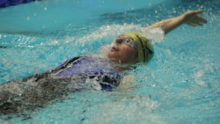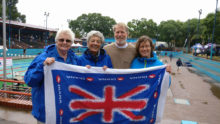
The benefits of outdoor winter swimming for Masters swimmers
March 6, 2015Cold swimming convert and Masters swimmer Suzy Hegg reports on the benefits of her first bone-chilling winter swimming season and how it can help Masters swimmers prepare for the indoor meet calendar.
Preparing for the winter season
Every Sunday last winter I donned my swimming costume, two hats (for warmth), Ugg boots, leggings and dryrobe, and drove down to my local open water swimming lake ready to immerse myself in temperatures south of five degrees in preparation for the ‘season’.
What sparked this seemingly crazy choice of activity you might ask? Last year, I was asked by Martin Ball (aka Working Class Triathlete) to join a team competing at Phish – an invitation only ‘ice swimming’ meet held at Parliament Hill lido every January.
Similar to the parameters of the Channel Swimming Association, no wetsuits, gloves, socks, or even kneesuits were allowed. Swimming costumes only!
What an amazing feeling! Every week, the lake was colder but my feet never felt as painful again – I was starting to acclimatise.
With temperatures likely to plunge to below 5°C, it was therefore imperative I acclimatised myself to the cold water – a process which takes at least eight weeks.
The first time I put my feet in the 10°C degree lake, I felt intense pain immediately in my feet which didn’t disappear for at least five minutes. Full body immersion followed, but only after I had exhaled and controlled my breathing.
Cold water immersion encourages fast inhalation of breath which can cause swimmers to drown. The stress on the heart is immense and shock is a bigger cause of deaths in cold water than hypothermia.
After a couple of laps (400m), I got out of the lake and started to feel the blood return to the surface of my skin. What an amazing feeling! Every week, the lake was colder yet my feet never felt as painful again. I was starting to acclimatise.
The day arrives
The day of Phish finally arrived. My teammates in the ‘Lincolnshire Elite’ relay were Martin Ball, Jo Hemming and Craig Oliver, for whom this swim was his ‘comeback’.
I can honestly say I had more fun than at any other Masters gala in 14 years of competition. Gone were the anxieties over personal bests, medals, warm-ups, replaced by the thrill of knowing you are putting your body to the test both physically and mentally.
I can honestly say I had more fun than at any other Masters gala in 14 years of competition.
The additional stress on your heart, combined with racing, is what makes this into the ‘extreme sports’ list. Post swim, we were encouraged to grab a hot drink and join others in the sauna.
Shivering while trying to drink hot Vimto is not for the faint-hearted! Our Lincolnshire results were impressive – six final appearances, a clutch of golds and a relay win under our belts.
Fitter, leaner, faster
On embarking on my cold water adventure, I thought it would be detrimental to my pool swimming. ‘I might get ill’, I thought, ‘I am replacing my 4km pool session with a 400m spin in a cold lake’. What I didn’t realise is that this process would make me fitter, leaner and faster in the pool.
It’s not just about the health and training benefits. The truth is it’s really fun with a great atmosphere, decent people and good sport thrown in!
Cold water acclimatisation can actually burn more calories than endurance pool swims. It encourages the store of brown fat (rather than white) improving metabolism and aiding weight loss.
It also prepares swimmers well for the upcoming open water and triathlon season and gives a head start on others who haven’t done the winter season.
In my last Masters gala a month ago, I posted three personal best times. In one swim, I even slashed four seconds off my previous season’s best. It’s also the first winter I’ve endured in England without getting a bad cold, which Masters swimmer will know really hurts your training schedule.
More than just health benefits
But it’s not just about the health and training benefits. The truth is it’s really fun, it’s a really good atmosphere, full of decent people and some good sport thrown in.
Friends call me a nutter but I feel like I’ve joined a secret club.
It makes the most of an otherwise miserable time of year. You also become part of a niche sport and a tight-knit community that really look out for one another.
Friends and relatives regularly tell me what a nutter I must be to swim in temperatures near freezing. But to be honest, I feel like I’ve joined a secret club.
 Masters Swimming Hub
Masters Swimming Hub



